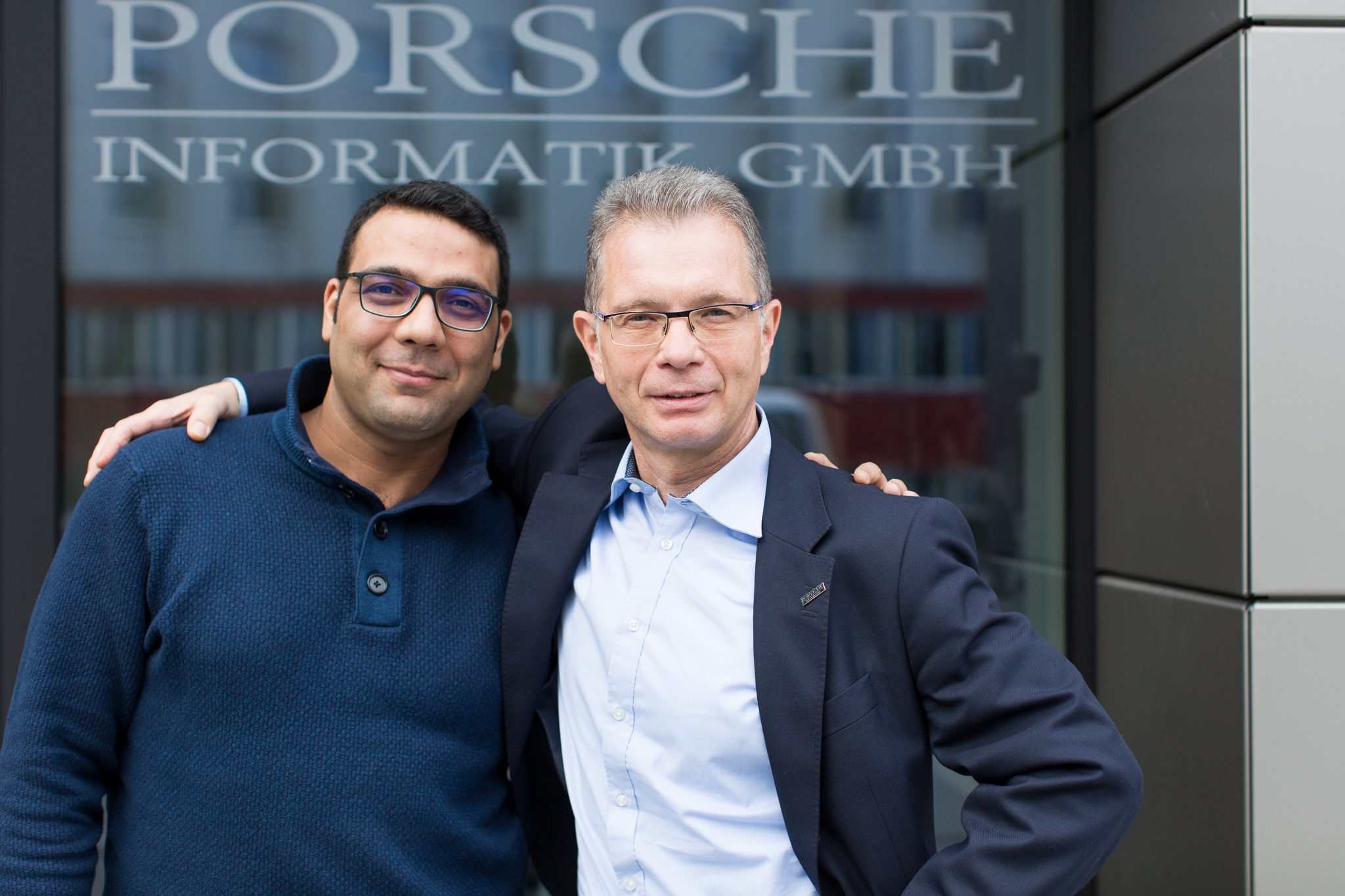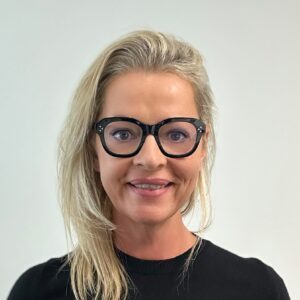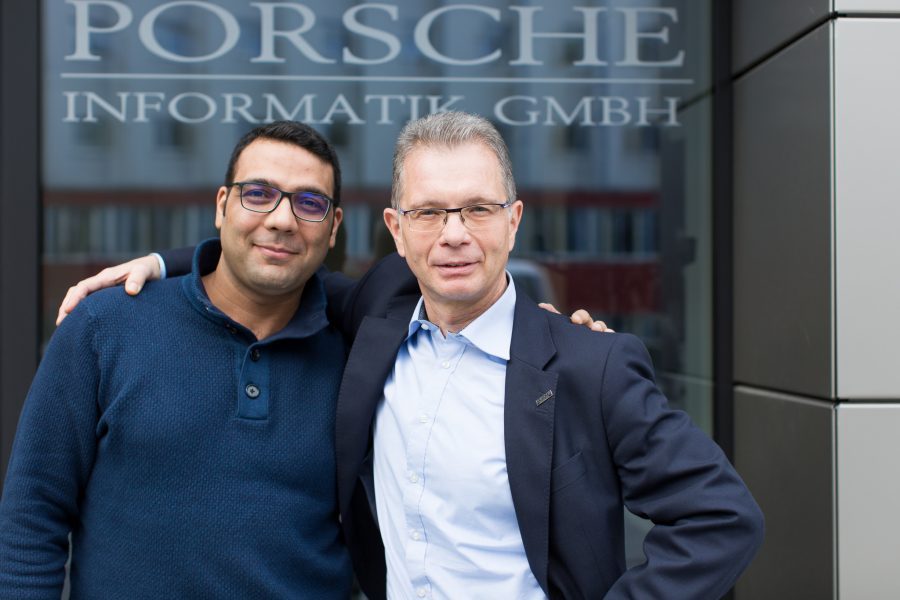
Omid Delawar migrated from Iran and joined us here in the company via an integration programme run by the Austrian Chamber of Commerce. He and his mentor, Anton Spitzer, have since become more than merely colleagues. In the following interview, the two of them share their experiences.
Toni and Omid, how did you meet each other?
Toni: The Chamber of Commerce integration programme ran for 6 months and also involved a mentoring project: “powerful partnership instead of social project”. This provided qualified migrants, who had received good vocational training in their home countries, with support from selected mentors from the widest variety of industries in gaining a foothold in the Austrian employment market. Since 2008, there have already been 24 rounds of the project with nearly 900 mentoring pairs in Vienna, Lower Austria, Upper Austria, Tyrol, Salzburg and Styria.
A former colleague from the Porsche Holding HR department took part in this. She knew me and asked whether I would like to become involved in this project as a mentor. My task was to provide support with life here, for example in dealings with the authorities, or simply to help when problems occurred. One key aspect was that mentors should not perform any activities or transactions for their mentees or act as a teacher or leader, but rather be a companion on their path to independence.
Omid: In Iran, I was a self-employed IT systems engineer. I heard about this project by accident and applied to take part. We met subsequently at a kick-off event organised by the Chamber of Commerce in October 2013. This was more or less a pilot project in Salzburg, making the two of us “pilot partners” as it were.
Omid, how did you come to Salzburg?
Omid: My path led me accidentally to Salzburg. When I left my home country of Iran with my wife, we travelled via Turkey to Austria or more precisely to Linz. From there, we wanted to travel on to England, because I speak very good English.
Linz, however, turned out to be the end of the line as we weren’t permitted to travel on to England. In Upper Austria there were no available places for new migrants, which meant that we by chance ended up in Salzburg, where there was a fund that helps people with integration, and I was given the opportunity to take a German course. That’s where I then met Julia from Porsche Holding.
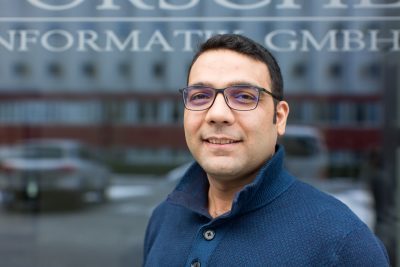
How did you subsequently arrive at Porsche Informatik? This project was originally of a private nature.
Omid: Work experience days were arranged with companies as part of the project. Toni offered me the chance to spend this work placement at Porsche Informatik – on a daily basis to begin with, but then over a number of months.
Toni, how was your experience in the company? Were you supported or were obstacles placed in your path? Was it difficult to arrange this work placement and your support?
Toni: No, it was really quite straightforward. The management board gave their consent and I organised everything else myself. My managers also assisted in integrating Omid into Porsche Informatik.
What was the decisive factor that got you involved in this project? After all, it’s not an easy task, and it comes with a great deal of responsibility.
Toni: It may sound funny now, but when I started work in Salzburg many years ago, as a German citizen this involved a huge amount of work or, in other words, an unbelievable number of official formalities. For example, I had to present myself to the Austrian Employment Service (AMS) every year to obtain a work permit for another twelve months. Consequently, I knew that it can be very difficult and stressful, particularly for people whose first language isn’t German!
Omid, what were your initial experiences like at Porsche Informatik?
Omid: First I was allowed a first-hand look at several Infrastructure departments, before I found a fixed role in the User Service Team. There I completed another five-month internship. My colleagues in Infrastructure and particularly in this team helped me integrate immediately and gave me plenty of support.
How did things progress from there? You now have a permanent job with us, I believe.
Omid: I went to the AMS and asked if I could take an apprenticeship to become an IT engineer and obtain a professional qualification that is also recognised in this country. Unfortunately, this request was rejected at first, but then Toni helped me out. After a telephone call and a rather lengthy discussion with the friendly clerk, he managed to clarify that I was the right candidate for such a vocational training course and the associated support from the AMS. As a consequence, I successfully completed my apprenticeship this year. Whereby I would like to add that – in contrast to a “normal” IT apprentice – I obtained additional qualifications in mathematics, physics and network technology.
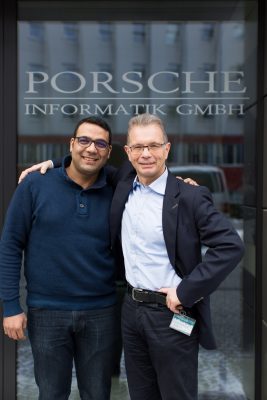
How do you feel in your new home town? Do you intend to stay or do you have other goals?
Omid: I am very happy here in my new home, particularly at Porsche Informatik. I feel completely integrated. Outside the company, I do not always encounter goodwill; sometimes people treat me with a degree of suspicion. But as soon as they hear how well I speak German now and see that I’m trying to integrate completely, the mood almost always changes for the better. My wife and I have also applied for Austrian citizenship.
Toni: Omid is a very hard-working and independent person. Over the years, he hasn’t required much support from me at all. He is an ambitious person with a will to integrate and an unbelievably positive, friendly attitude.
Omid, you are now working in Network First-Level Support. How do you get along with customers and colleagues? Are there any occasional language problems and have you had any negative experiences in Support?
Omid: I was a little afraid to begin with, when my German wasn’t so good. But I prepared myself as well as I could before every customer telephone call and I always received excellent support from my colleagues. I noticed very quickly that if you have specialist knowledge and act with self-confidence, then everything works quite well.
My self-confidence has grown over the years, my German is improving continuously and when customers praise me that contributes positively to my development. Occasionally there are difficult situations, but then my colleagues can step in and take a support case from me.
Toni, your mentoring is over. How do you see your “relationship” now?
Toni: I will continue to help Omid when he needs me. As a mentor, you take responsibility for a person, and you don’t just relinquish such a responsibility after six months. This is a responsibility for life, which may diminish over time, but the relationship remains.
I have to admit that such a responsibility really takes quite a bit out of you, costing energy and strength, but I will gladly continue to support Omid as and when required. Omid is not my only responsibility either. Many years ago in Nepal, I became a sponsor for a Nepalese youngster. Today this young man can afford to study and can look forward to a bright future.
Omid: Metaphorically speaking, Toni is not a car for me, but a navigation system that guides me reliably to my destination.
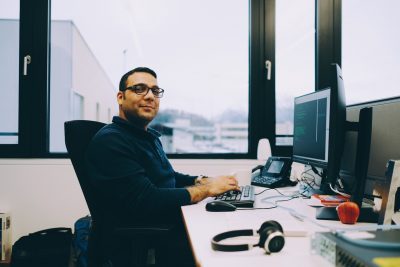
Omid, have you set yourself any professional goals for the coming years or will you continue to simply trust in fate? After all, fate has guided you quite benevolently step by step so far.
Omid: I have no annual plan, but I am ambitious and optimistic. I successfully completed two more Cisco certificates in 2017, and I am now training to become a “CISCO-certified Network Professional”. For everything else, I trust in myself and my fate, my confidence and my positive attitude.
Omid and Toni, do you have any tips and advice for people in similar situations?
Omid: Never give up! You need to play an active role and not just wait until something happens. I learn a lot in my leisure time. And you shouldn’t be afraid. Many people are afraid of trying something new, but that’s the wrong approach. Life will reward you if you’re ambitious and do something to deserve it.
Toni: I can only agree with that. To play an active role, “TO WANT”, to take a path self-sufficiently – that gives courage and leads to success. And, as you can see, to successful integration!

